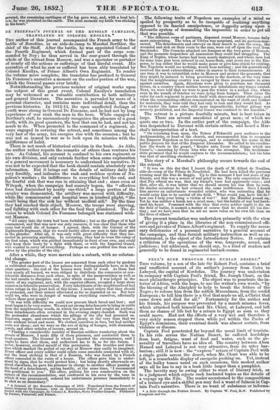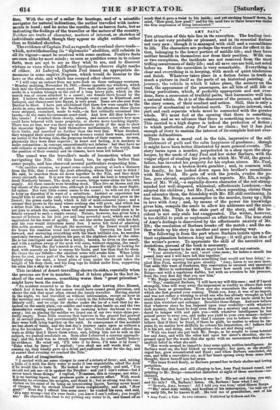PEEL'S RIDE THROUGH THE NUBIAN DESERT..
THIS volume, by a son of the late Sir Robert Peel, contains a brief and unaffected account of its author's journey from Cairo to Labeyed, the capital of Kordofan. The journey was undertaken in company with Captain Peers friend, Mr. Joseph Churi, on the most philanthropic principles. The object was to penetrate the in- terior of Africa, with the hope, to use the writer's own words "by the blessing of the Almighty to help to break the fetters Of the Negro ; to release him from the selfish Mussulman, from the sordid European ; to tell him there is a God that made us all, a Christ that- came down and died for all." Fortunately for the author and his friends, his purpose was prevented by a marsh miasma fever, which attacked both himself and Mr. Churi, at Labeyed, and left them no chance of life but by a return to Egypt as soon as they could move. Had not the effects of a very wet and therefore a very sickly season stopped them while yet within the Pacha of Egypt's dominions, their eventual death was almost certain, from violence or disease.
Captain Peel penetrated far beyond the usual limit of tourists. In his ride across the Nubian Desert, he suffered hardships from heat, fatigue, want of food and water, such as the ge- nerality of travellers have no idea of. The country between Aboir Mimed and Labeyed is not very attractive, from its utter bar- barism ; still it is new : the "express " return of Captain Peel with a single guide across the desert, when Mr. Churi was able to be left, is a remarkable display of energetic pushingion. Yet, instead of the bulky tomes usual on such occasions, this modest author says all he has to say in a book little larger than a pamphlet. The brevity may be owing either to want of literary trick, or to a judgment which rejects such hacknied topics as the details of a voyage up the Nile. The reader accustomed to the compositions of a trained eye and a skilful pen may feel a want of fulness in Cap- tain Peel's narrative. There is no want of substance or informa-
• A Ride through the Nubian Desert. By Captain W. Peel, R.N. Published by Longman and Co.
tion. With the eye of a sailor for bearings, and of a scientific navigator for natural indications, the author travelled with instru- ments in hand ; and he notes the results, not as barren facts, but as indicating the feelings of the traveller or the nature of the country. Neither are traits of character, matters of interest, or sketches of individuals omitted, though they appear as slight outlines rather than as finished sketches.
The evidence of Captain Peel as regards the overland slave-trade- which, notwithstanding its " " abolition, still subsists in all its vigour—must be reoeiJai with some caution. Positive facts are seen alike by most minds ; as soon as qualities come in to colour facts, men are apt to see as they wish to see, and to discover
virtues or vices where indifferent bystanders observe slight marks of either. At Labeyed, Captain Peel traced an appropriate de- meanour in some captive Negroes, which would do honour to the hero or the stoic, and which has escaped other observers. " I will copy an extract from my note-book on these unhappy creatures. ' Monday morning, November 10, 1861.—Scene opposite toy windows, which look into the Government court-yard. Five male slaves just arrived ; their necks in a wooden triangle at the end of a long heavy pole, which on the march was of course attached to a camel; one female slave bound by the feet. I believe the number of slaves brought every year to Khartoum and Labeyed, and thence sent into Egypt, is very great. Some are also sent from Darfoor to Sioot. I have just ascertained that these few were caught by the Arabs in some mountains to the Southward. In the afternoon these slaves were stripped, examined, made to walk,—in fact critically examined like beasts,—m the same Government court-yard. And how did they behave— like beasts? I watched them closely, unseen, and cannot conceive how men could have behaved with more propriety, or shown more touching dignity. There was no fear, nor was there any momentary pride of the man to show his muscular figure : they held themselves mechanically, let others bend their limbs, and marched no further than the very line. When finished, they wrapped their scanty clothing with decency round their waist, and took no notice of the flowing robe, the gorgeous turban of their masters. As men, physically they were their superior; in heart and feeling, it is mockery to make comparison • in courage, unquestionably not inferior : but they have no self-reliance or moral strength, and in the onward march of the world, from the position of their country and its climate, have been left behind."
The camel was the traveller's mode of locomotion when not navigating the Nile. Of this beast, too, he speaks better than some people, and has observed several particulars respecting him.
"On another occasion, we passed some camels grazing at such a distance from the Nile, that I asked the Arab attending, where they went to drink ? He said, he marches them all down together to the Nile, and they drink every eleventh day. It is now the cool season, and the heat is tempered by fresh Northerly breezes. The Arab, of oonrse, brings water-skins for his own supply. All these camels were breeding stock. They live on thorns and the to shoots of the gum-arabic tree, although it is armed with the most fright- ful spikes. But very little comes amiss to the camel ; he will eat dry wood to keep up digestion if in want of a substitute. Instinct or experience has taught bun to avoid the only two tempting-looking plants that grow in the Desert; the green eusha bush, which is full of milk-coloured juice ; and a creeper that grows in the sand where nothing else will grow, and which has a bitter fruit like a melon. I was surprised to learn that the leopard does not dare to attack the camel, whose tall and narrow flanks would seem to be fatally exposed to such a supple enemy. Nature, however, has given him a means of defence in his iron jaw and long powerful neck, which are a full equivalent for his want of agility. He can also strike heavily with his feet, and his roar would intimidate many foes. I never felt tired of admiring this noble creature, and through the monotony of the Desert would watch for hours his ceaseless tread and unerring path. Carrying his head low forward, and surveying everything with his black brilliant eye, he marches resolutely forward, and qnickens his pace at the slightest cheer of the rider. He is too intelligent and docile for a bridle; besides, he lives on the march, and with a sudden sweep of the neck will seize, without stopping, the small- est straw. When the day's march is over, he passes the night in looking for food, with scarcely an hour to repose his limbs, and less than that for sleep. He closes the eye fitfully—the smallest noise will awake him. When lying down for rest, every part of the body is supported ; his neck and head lie lightly along the sand, a broad plate of bone under the breast takes the weight of his deep chest, and his long legs lie folded under him, supporting Iris sides like a ship in a cradle."
This incident of desert-travelling shows its risks, especially when the persons are few in number. Had it taken place in the hot in- stead of the cool season, something worse than "great privation"
mightmight have been the result. accident occurred to us the first night after leaving Aboo Hamed, which had it been in the hot season would have caused great privation, and shows the risk that must often attend the lonely traveller. Having started in the night, we had travelled on without intermission, except an hour in the morning and evening, until one o'clock in the following night. It was )utterly cold • and we crept for shelter under the lee of a rock that lay de- tached the sandy plain, oar saddles and water-skins beside us, and the two dromedaries resting alongside. In the morning before daybreak we were away ; but on placing the saddles we found one of our two water-skins per- fectly empty. Same little creature that burrows in the ground had gnawed it in several places, but providentially had never touched the other, though they were both lying together on the sand. In consequence of this accident we ran short of water, and the last day's journey came upon us without a drop for breakfast. The last dregs of the skin, which the Arab offered me, were so filthy that I threw them away, and, telling him not to talk on the subject, we pushed resolutely on. Soon after I observed a caravan approach- ing ; and the Arab was so struck with superstition, he could hardly believe its evidence. He cried out, take it by force, I'll take it by force!' 'Take what by force ? ' I replied; 'you shall use soft words first.' On coming up, they kindly gave us a drink sad sufficient water for the day, and at sunset that evening we reached the Nile."
An effect of imagination.
" I carried with me some vinegar in case of a return of fever ; and, mixing a little of it with the dirty water to make it less unpalatable, asked the Arab if he would like to taste it. He looked at me very archly, and said, You should not ask me—it is against the Prophet : and yet I can't refuse—but I never touch those things.' I replied, Nonsense, this is vinegar, not wine ; it is no heating liquor, but produces quite a contrary effect.' With much difficulty he overcame his scruples, and drank it ; but so strong was the con- viction on his mind of its being an intoxicating liquor, having never heard of vinegar, that he stroked himself down complaceully, and said, How good ! ' Next day I offered him some more : he winked his eyes, and said, 'It's very wrong—but it's your fault; you know I can't refuse ; you taught me.' He objected this time to my putting any water to it, and tossed off so
much that it gave a twist to his inside ; and yet stroking himself down, he cried, ' How good, how good!' and for the next two or three hours was under the firm impression of being intoxicated."



























 Previous page
Previous page